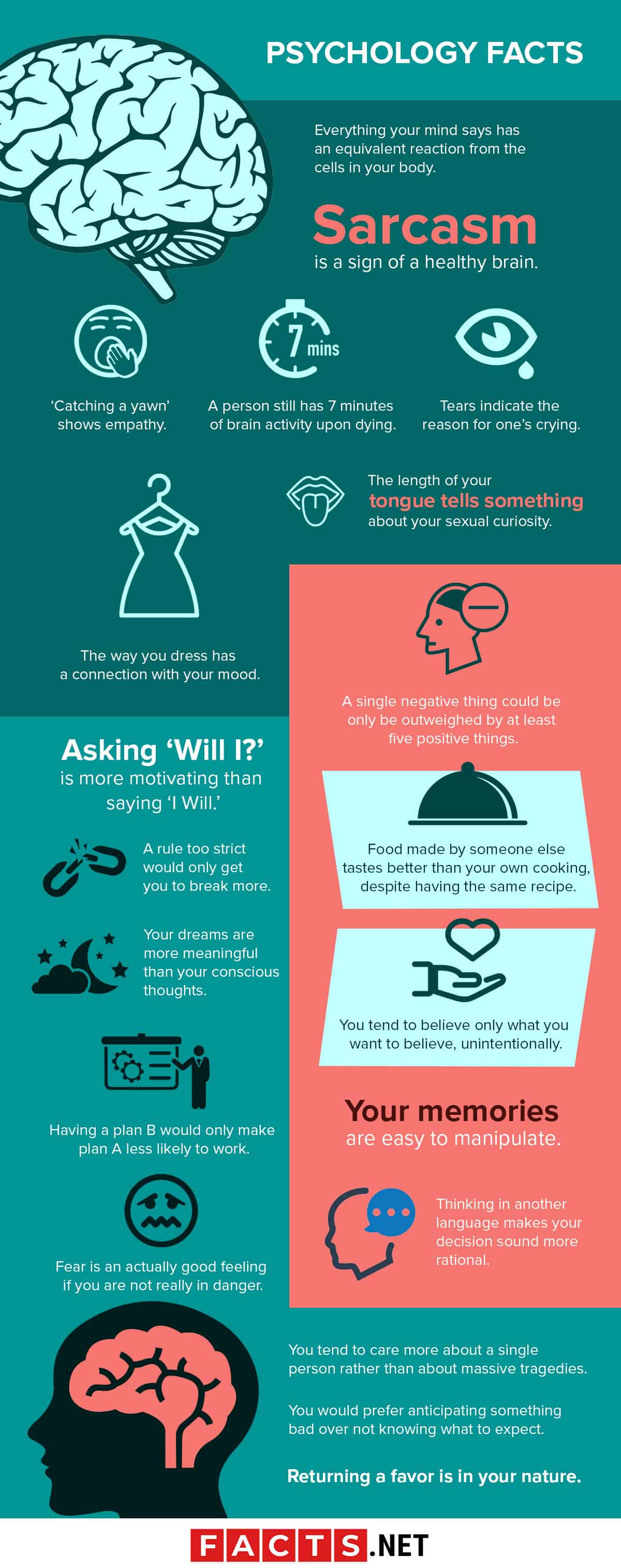
The American Psychology Association defines Psychology as the scientific study of the mind and behavior. Through the years if the said practice, it has been subject to many misconceptions regarding its real nature as well as of its practitioners. Still, its many discoveries on the human psyche are one of the fun things about it.
Here are a few interesting psychology facts that you definitely need to know.
- A gene is the cause of one being negative almost all the time.
- Good liars are also the good ones in detecting lies from others.
- Tearing the paper off drink bottles is a sign of sexual frustration.
- The type of music you listen to has an impact on your perception of the world.
- Having positive and happy people around you can keep you happier.
- Remembering a past event brings up the last time you retrieve it in your memory rather than the event itself.
- The brain replays memories and creates perfect moment scenarios 70% of the time.
- You tend to recall all your bad deeds 98% of the time when you are told that someone has to ask a question.
- Even though you have overslept already, you still have the tendency to desire more sleep.
- People who take interest in serial killers turn out to be better conversationalists.
- Of all the people born blind, none has been found to have developed schizophrenia.
- Spending money on experiences have a greater value for you.
- Singing could make you feel less anxious and depressed.
- Among all psychological disorders, anorexia holds the highest mortality rate of 5% to 20%.
- Severe depression increases the aging process in cells, thus causing biological aging.
- The fact that falling in love only takes 4 minutes is psychologically proven.
- The feeling of ‘being in love’ is the brain’s chemical reaction, not the heart’s.
- Having higher IQs make it harder for women to find a mate.
- That last person you think of before you sleep is either the reason you are happy or in pain.
- 90% of people take into texting the things they could not express in person.
Psychology Facts Infographics

Everything your mind says has an equivalent reaction from the cells in your body.
It is the reason why amounts of negativity eventually take your immune system down and make you feel sick.
Sarcasm is a sign of a healthy brain.
People who could instantly use sarcasm in response to a trivial question have healthy minds. Moreover, those who could understand cynicism well are also good at reading people’s minds.
‘Catching a yawn’ shows empathy.
Yawning upon seeing someone else yawn is a common occurrence, despite not feeling tired nor sleepy. One theory on its contagiousness is that people ‘catch’ it to show empathy.
Hence, toddlers and young people with autism are less likely to have the symptoms as they have yet to learn compassion.
Tears indicate the reason for one’s crying.
If the first teardrop came from the right eye, the person is crying tears of joy. Otherwise, the person is crying tears of pain.
A person still has 7 minutes of brain activity upon dying.
In those moments, they see their memories in a dream-like sequence.
The length of your tongue tells something about your sexual curiosity.
If you could lick your elbows, then it means that you are more willing and open to trying new experiences.
The way you dress has a connection with your mood.
It is not just in the color that you choose to wear. Dressing well could also help in keeping you stable and happy.
A single negative thing could be only be outweighed by at least five positive things.

Your brain remembers bad over good; an effect of this thing called ‘negativity bias.’ It is also the reason why you keep dwelling on how a coworker insulted your outfit despite hearing a compliment from your client.
In order to have a balance, a 5:1 ratio of positive to negative is a must.
Food made by someone else tastes better than your own cooking, despite having the same recipe.
A study found that making a meal requires you to stand around it so long that it already feels less appealing by eating time. Hence, your satisfaction decreases subsequently.
You tend to believe only what you want to believe, unintentionally.
The human brain is also captive to ‘confirmation bias’ which makes people render facts to somewhat confirm what they already believe. For instance, your grandpa changing his political opinions has little to no chances despite your swaying attempts.
It is just one of the psychology facts that you could not change and just have to accept.
Your memories are easy to manipulate.
In a span of 3 hours, you could be wrongly convinced that you committed a crime in your teenage years.
Thinking in another language makes your decision sound more rational.
You tend to be less discerning about money in your native tongue. In other words, the language you use affects your decisions.
Asking ‘Will I?’ is more motivating than saying ‘I Will.’
A study from the University of Illinois suggested that asking goal-related questions to yourself could motivate you more than declaring it to be true.
A rule too strict would only get you to break more.
Psychologists found how this ‘reactance’ phenomenon affects people’s perception of rules. Not only would they want to break a certain rule that takes certain freedom away; they would also break more aside from that.
This might be the part of psychology facts behind a teenager who is not allowed to use a phone in class would even chew gum in the act of doing so.
Your dreams are more meaningful than your conscious thoughts.

Among all of the dreams you have had, 70% of it contains secret messages. It means that they bear more importance and worth than the things you think in your conscious.
Having a plan B would only make plan A less likely to work.
The University of Pennsylvania held a series of experiments that revealed that volunteers who prepared a backup plan before starting a task did worse than those who did not. Team Plan B realized that having options made their motivation to succeed the first time drop.
While it is good to think ahead, keeping those plans vague first could make you be more successful.
Fear is an actually good feeling if you are not really in danger.
There are people who love scary movies and there are those who do not, and the difference might be in their hormones. Such activities give you adrenaline, dopamine, and endorphins from a fight-or-flight response.
However, your brain knows that you are not in real danger, so you still get that natural high despite how scared you feel.
You tend to care more about a single person rather than about massive tragedies.
Another one from the University of Pennsylvania, this study had one group learn about a starving little girl, another group learn about starving millions and a third group who learned about both situations. The results showed that people who heard about the little girl donated more than twice the amount than when they heard the statistics.
Psychologists believe that although you would willingly help a person, you would conclude that your little part could not do much when a problem seems too big.
You would prefer anticipating something bad over not knowing what to expect.
Researchers found that something negative that is about to happen is less stressful to grasp than not knowing how things will end up.
The consequences-predicting part of your brain becomes more active when you have no idea what to expect.
Returning a favor is in your nature.

Good manners could not take credit over the ‘rule of reciprocity.’ This brain command programs you to want to help someone who helped you.
It might have developed with the goal of keeping the smooth flow of society.
Being tested on things help you remember them better.
Some psychology facts for the kids: testing is an efficient tool for learning. A study discovered that information could last longer in the memory of a person tested for it than when only studied without the need to remember immediately.
You obsess over things which you feel you lack.
Take money for example. The human brain is scarcity-sensitive; it constantly feels that you are missing things that you need.
Farmers, for instance, come up with better plans when the cash flow is good than when money is tight.
You are in a constant search for human faces in inanimate objects.
This sensation is called ‘pareidolia’ which scientists think came from the notion that face recognition is an important part of social life. It entails how your brain tends to find a face where there is none rather than missing a real one.
You always find a problem.
It is psychologically normal for you to find another problem upon resolving one. One research demonstrated that volunteers who are asked to select computer-generated faces that look threatening eventually resorted to faces that do not.
It turns out that as the volunteers ran out of threatening-looking faces, they started turning to faces that they would usually call harmless.
People would rather alter facts than change their opinions about people.
As much as ‘cognitive dissonance’ normal, you hate it when reality contradicts your beliefs. It explains why you undermine a loved one’s wrongdoings despite how bad it is.
High expectations incline people to rise to it while low ones have no such effects.
The Pygmalion effect holds the explanation as to why you do better when other people believe you would. On the contrary, you could not do well when someone expects you to fail.
Crying has benefits.

Doing so could make you feel a lot better, reduce stress, and could even help in keeping your body healthy.
It is possible to feel certain about something without facts or reasoning.
Undergoing electric simulation over that specific part of your brain could trigger a feeling of certainty despite the absence of evidence or logic.
Some people are afraid of feeling too much happiness.
It is due to the fear of the pattern that something tragic might happen next.
There is a reason why that song is your favorite.
It is not just about the lyrics or the tune, it is because you link that song with an emotional event in your life.
Smart people tend to depreciate themselves.
On the other hand, ignorant people think they are excellent. This psychology fact would make you take a second look at the people that you know and how they present themselves.
The pain from being ignored is not an overreaction.
This feeling has similar chemical effects as to that of a physical injury. Hence, your brain handles rejection like it would with physical pain.
Being lonely is worse for your health than you actually think.
A Harvard University study found a connection between extreme loneliness and the very same levels of the blood-clotting protein responsible for stroke and heart attacks.
In other words, not having friends could have the same deadly effect as smoking.
Psychology facts proved that power lessens a person’s care for others.
Aside from the Stanford Prison Experiment, other studies found that people who are in the position of power become worse at assessing another’s feelings. It shows in their lack of facial expression which is a major indicator of loss of empathy.
Receiving rewards could convince you that a boring task was fun.

A study paid volunteers to convince someone that a boring task was actually interesting. Those who lied yet still find the activity boring got paid $20. On the other hand, those who did not have a genuine reason to lie and convinced themselves that the task was truly fun were only paid $1.
Your brain gives less importance to long-term deadlines.
Yes, you are a procrastinator for a psychological reason. The brain makes you prioritize urgent tasks, regardless of its importance, because it knows that you could complete them.
Optimism could be taught.
What’s more, is that researchers also observed that you could teach it to yourself.
Psychologically speaking, there is more behind an internet troll.
Scientists claim that most of them are naturally psychopathic, narcissistic and sadistic.
What considered normal anxiety levels has increased over the years.
The average 1950s psychiatric patients demonstrated the same level of anxiety that could be found in today’s average high school kid.
People aged between 18 and 33 carry the most amount of stress in the world.
The stress levels only tend to reduce after the border age of 33.
France is the most depressed country in the world.
For every 5 people, 1 suffers from depression. Above ⅓ of Europeans overall have a mental health disorder.
Artists from creative fields have an 8% greater chance to suffer from bipolar disorder than those from less creative ones.
Studies have found a connection between bipolar disorder and a person’s creativity. But this definitely does not mean all creative people have bipolar disorder, and not everyone with bipolar disorder are creative.
A broken heart could be a legitimate cause of death.
The broken heart syndrome is also called stress cardiomyopathy, and it could lead to critical, short-term heart muscle malfunction.
The influence of power could have the same effect on a person as that of a traumatic brain injury.
Victims become more unpredictable, less concerned about risks, and less proficient at being sympathetic and emphatic.
Your addiction to social media is the result of its psychological scheme.

This formula is the real reason why you continue to scroll Facebook despite only going there to check some notifications. Being able to stay on the site regardless of interaction and activity is relevant to the infinite scroll where your brain does not get any stop cue.
There is a psychological reason why you felt that your phone vibrated when there is actually no notifications.
This condition is called the Phantom Vibration Syndrome, and a whopping 68% of the population suffers from it.
If you think that your idol is in love with you, there is a huge chance that you are suffering from a mental illness.
A psychological disorder named ‘erotomania’ occurs when a person who believes that a famous identity is in love with them.
Some people live their life as if they are in a reality TV show.
They suffer from what is called the Truman Syndrome. Patients with this psychological disorder believe that they are, indeed, stars in a reality TV show.
Getting your hopes too high for Paris could give you a mental health disorder.
Mainly Japanese people suffer from Paris Syndrome, a psychological disorder caused by disappointment from realizing that Paris is not what they expected it to be.
Local culture is one of the factors that affect hallucinatory voices.
For one, voices in the U.S. sound harsh and aggressive. Whereas schizophrenics in India and Africa hear more mild and playful voices.
Hikikomori is a common mental health condition in Japanese males.
Approximately a million of this population lock themselves in their bedrooms for years. Subsequently, they generate social and health problems thus called the hikikomori.
Narcissistic Personality Disorder occurs in about 6% of the population.
This condition shows symptoms of having a sharp sense of self-importance and an apparent lack of empathy.
A person with Narcissistic Personality Disorder often also suffers from depression or anxiety.
However, this coexistence is usually the sole reason why a narcissist would opt for therapy.
Tylenol a.k.a. acetaminophen is not only good for physical aches, pains, and fever.
It is also known to alleviate psychological conditions like social rejection.
Antidepressant drugs carry more than just sexual side effects.

It could also suppress any human emotions relevant to love and romance.
There is a psychological reason behind your urge to go to the beach when you need a vacation.
The sight of water has that soothing effect that makes people who witness it happier, calmer and even more creative. Hence, living in such a view is a good idea.
Paranoia has its opposite disposition.
Known as the pronoia, this delusion makes you think that people have secret plans for building your success.
People tend to value objects more when they assembled it by themselves, even just partially.
Primarily named after furniture from the famous store, the ‘IKEA effect’ is the cause of the irrationally high value on such objects in spite of the end result’s quality.
Leonardo Dicaprio’s movie ‘Inception’ highlighted ideas from psychological scientists.
Beyond the special effects and great actors of the movie lies a deep storyline. It lowkey demonstrated how ideas could be instilled into a person’s mind and integrated into its memory, as per the Association for Psychological Science.
A man named Billy Milligan had 24 personalities.

He was born in Florida in 1955, but that ‘he’ only pertains to his core personality named William Stanley Milligan. Aside from him, 23 others reside in his head, 2 of whom committed crimes such as robberies and rapes.
However, Billy did not serve jail time and instead got sent to the Athens Mental Health Center due to ‘insanity’.
Aren’t these psychology facts enlightening? May the 80 psychology facts make you more aware and interested about the science of the mind!
Was this page helpful?
Our commitment to delivering trustworthy and engaging content is at the heart of what we do. Each fact on our site is contributed by real users like you, bringing a wealth of diverse insights and information. To ensure the highest standards of accuracy and reliability, our dedicated editors meticulously review each submission. This process guarantees that the facts we share are not only fascinating but also credible. Trust in our commitment to quality and authenticity as you explore and learn with us.
